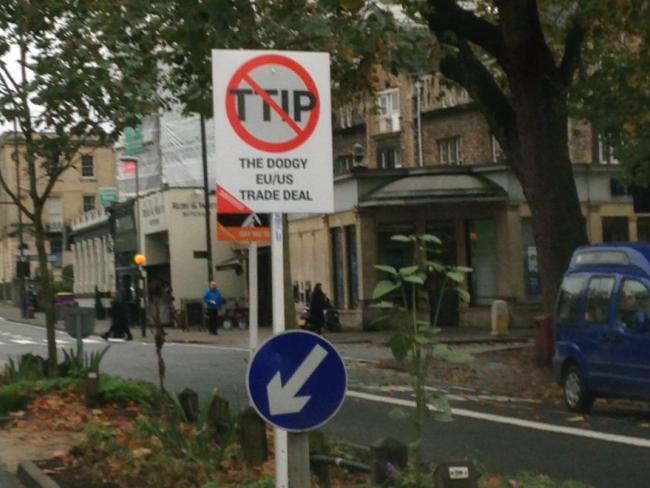
Street sign in Whiteladies Road, Bristol, during the anti_TTIP campaign, 2015. Photo Workers.
For Britain to leave the EU and then seek to join other trade blocs is the opposite of asserting independence and sovereignty. Free trade agreements might sound good, but they are bad for workers and national economies.
On 31 March the government concluded negotiations for Britain’s accession to the Comprehensive and Progressive Agreement for Trans-Pacific Partnership (CPTPP). As far as Downing Street and the 11 existing members of bloc are concerned, it’s a done deal.
The government claims that joining a bloc which accounts for about 13 per cent of world GDP can be nothing but good for our economy and that growth and prosperity will follow. By this it means integrating economic activity in Britain even more tightly with global capitalism.
The Partnership is not about building industry, manufacturing and services here to meet the needs of British workers. Nor even primarily about the import and export of goods. These free trade agreements, and there are many in existence and proposed, are about far more than smoothing trade – they are about protecting capitalist investment and the right of capital to move freely.
Free trade and war go together too. Britain’s latest and most extensive free trade agreement post-Brexit followed on the agreement of a defence pact with Japan, signed in January. In the background, barely concealed, is the wish to limit and contain China – seen as a trade rival – and to support Taiwan.
Free trade agreements are negotiated in secret, away from anyone who might object or ask questions – like the working class in signatory countries.
These agreements always cede control over trade policy and protection for domestic industry. Transnational groups can pursue national governments in secret courts against perceived threats to their profits and rights to free trade.
'These free trade agreements are about far more than smoothing trade - they are about protecting capitalist investment and the right of capital to move freely...'
British workers have been here before. The Transatlantic Trade and Investment Partnership treaty (TTIP) was proposed in 2010 between the EU and the USA. It followed the same pattern – promoted on claims of the benefits of free trade, secret negotiations and hidden processes outside national control.
There was a huge opposition to TTIP from workers in Britain and other EU member states. In Britain trade unions and other groups joined demonstrations and campaigned against joining TTIP through 2014 and into 2015.
There was public debate about the threat to British industry, as well as to public services like education and the NHS. And the dispute resolution process was seen as totally loaded towards international companies.
TTIP was finally killed off by President Donald Trump in 2018. But by then Britain had delivered a bigger blow to the EU, by voting to leave in June 2016.
In the long, frustrating period where successive governments and EU cheerleaders tried to undermine or ignore the vote to leave the EU, there was much talk of trade and the need to continue to do business with EU member states. But among workers, how Britain should trade with nations took second place to the main task – forcing the government to act and to free the country from the EU.
Britain is again, after 50 years, able to negotiate trade deals directly with other nations. There is no need to replicate the EU’s trade policy and every reason to look critically at attempts to join trade blocs like the CPTPP.
Some Leave supporters try to draw a distinction between the CPTPP and being a member of the EU, on the grounds that the Pacific trade bloc has no ambition be a superstate. That ignores the fundamental nature of both blocs – the preservation of capitalism and the suppression of workers.
The TUC, though, has not forgotten the risks from transnational agreements. It questioned the benefits of joining the CPTPP when negotiations began in 2021, and opposes the government’s decision to join.
The fight for Britain’s independence is not yet won. Staying clear of transnational trade blocs, opposing ratification of the CPTPP and a return to the relative clarity of the campaign against TTIP would be a start. The arguments are the same, in or out of the EU.
